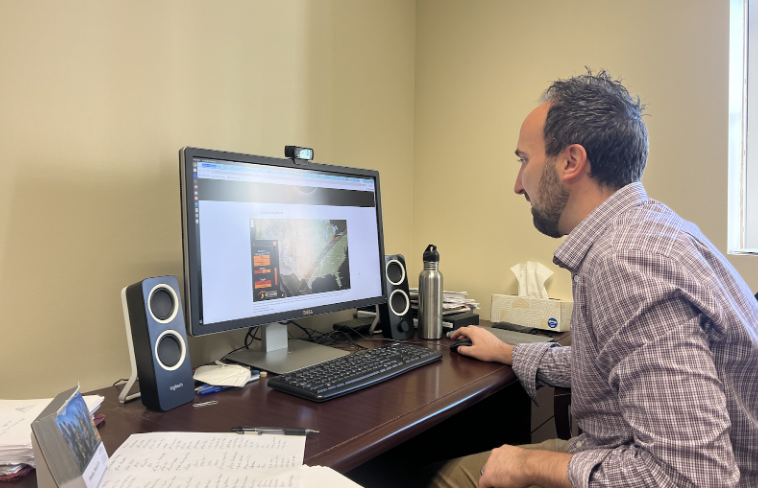On Tuesday Nov. 10, the SMU Tate Lecture Series hosted its third lecture of the 2015-2016 season with guest speaker Shankar Vedantam.
Held at 8 p.m. in McFarlin auditorium, Vedantam introduced the audience to his research on what he calls “information aversion.”
Vedantam, who graduated with an electrical engineering degree in his native India and earned his master’s in journalism at Stanford, worked as a science correspondent for NPR focusing on human behavior and the social sciences. He also is the author of numerous publications on the role of the unconscious mind in everyday life and moral decision-making.
After a gracious introduction by SMU President Dr. R. Gerald Turner, Vedantam took to the podium and began his lecture with enthusiasm, asking the audience to consider “an ostrich burying its head in the sand.”
According to Vedantam, just as ostriches are said to bury their head in the sand when eminent danger appears, humans demonstrate this effect in their everyday lives.
“We move away from things that are unpleasant or painful,” Vedantam said.
In other words, even though information given to humans may be necessary information to know, if is causes the individual emotional pain, he or she tends to ignore it and is much more likely to readily receive information that is “towards happiness.”
After explaining information aversion, Vedantam offered the audience numerous examples of how the idea of information aversion affects the daily lives of individuals, their health, and their behavior.
First, Vedantam gave an example concerning cancer. He asked the audience to imagine that a coworker is diagnosed with cancer. According to research, those who sit farther away or work in a different building than the person who is diagnosed are more likely to go get tested for cancer themselves.
However, the closer one was to the individual diagnosed, the more often one saw the person diagnosed, and the more severe the diagnosis was, the less likely the individual was to get tested. Vedantam asserted that this is an example of information aversion because the reality of getting a positive test back for cancer is painful, and individuals would rather not know than have to face reality.
In another health example, Vedantam brought up the idea of parents getting their children vaccinated. Studies show that when parents are shown pictures of children suffering from diseases that could have been avoided by vaccinations, parents were less likely to get their children vaccinated, even though one would think that showing parents what could happen without vaccinations would increase the likelihood of taking action. In other words, the pain of imagining their child having a horrible disease is too much for the parent to handle, so they avoid the possibility entirely by not even considering vaccination.
After a few more health and everyday life examples, Vedantam brought up an interesting study on professional soccer goalies. According to the study, most elite soccer goalies when in a penalty-kick situation jump to the right half of the goal while the other half of the time, they jump to the left. However, studies show that a third of the time, the ball goes to the right, a third of the time, the ball goes to the left, and the other third, it is kicked in the middle.
If a soccer goalie were to stay in the middle of the goal when the ball is kicked, he could increase his goal-saving percentage. However, studies show that goalies are reluctant to stand in the middle because it is a lot easier to avoid guilt when a heroic jump or lunge is attempted rather than staying in the middle. In this way, goalies are using information aversion to minimize the guilt, blame and regret if they were to miss the ball.
Vedantam’s most important point had to do with the idea of nature conservation and the idea that if humans ignore industrial mistakes and continue to harm the atmosphere, ecosystem, and natural resources, very bad things could happen.
“On a day to day basis, things don’t seem to change very much,” Vedantam said.” But if we look every 5 to 10 years, great impacts can be made.”
For more information regarding upcoming ticket
sales and dates of the SMU Tate Lecture Series, visit smu.edu/tateseries.













